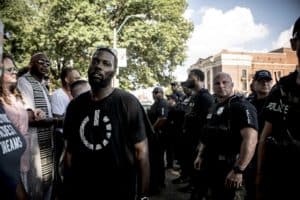‘This Has Exploded’: Fired Utility Worker’s Federal Case a Tale of Confederate Statues, Racism and Facebook
Daniel Connolly, Memphis Commercial Appeal, March 1, 2019
{snip}
“What I’m tired of is being portrayed as KKK or white supremacist simply because I’m a white guy that wants to preserve my heritage,” he said. This and other comments were broadcast nationally on MSNBC and published in The Commercial Appeal, along with the man’s name: Mike Goza.
{snip}
They complained to MLGW, which employed Goza as a skilled technician. The utility launched an investigation and learned of other comments Goza had made on Facebook. Among them: “Every city that’s a third world crap hole is majority black and run by blacks.” In another post, Goza appeared to support white nationalist violence, MLGW would say later.
Goza routinely went into customers’ homes to fix problems with their electricity, gas or water services. In a majority African-American city, this meant frequent interactions with black people.
MLGW told Goza he had to take another job that would keep him away from customers. That job paid much less. He refused the other job, and was fired.
In response, he filed a civil lawsuit, seeking to return to MLGW with back pay and monetary damages. He’s claiming race discrimination and violation of his constitutional rights to free speech and equal protection under the law.
A non-jury trial began Monday and concluded Wednesday, with U.S. District Judge Jon P. McCalla presiding. {snip}
A case that could set precedent
The case reflects broader issues. New technologies such as Facebook allow anyone to express controversial views to a big audience. Facebook also makes it easy for other people to track the person down and pressure their employer to fire them.
In most cases, private companies can legally fire employees for things they say. {snip}
But workers at public employers like MLGW enjoy greater freedoms, because the employer is the government, said [Vanderbilt University professor Bruce] Barry, who wrote the book “Speechless: The Erosion of Free Expression in the American Workplace.”
In 1968, the U.S. Supreme Court ruled in favor of a schoolteacher who’d written a newspaper letter to the editor and was fired. The court concluded a government employee could make comments on matters of public interest.
Barry said he’s concerned that members of public pressured MLGW to fire Goza. {snip}
Others have argued that shaming extremists can serve a greater good. News outlets including ProPublica and Frontline recently identified some white nationalists, causing them to lose jobs with institutions including a defense contractor and the Marine Corps.
The reporters on the project said they focused on white nationalists who took part in violence, and said the public should know how important institutions respond.
Experts say Goza’s case could impact free speech rights for the many people across the country who work for state, local and federal governments. {snip}
The Goza case could help set precedent, especially if the losing side appeals to the U.S. Court of Appeals for the Sixth Circuit, and could have even more influence if it goes to the Supreme Court, Hudson said.
‘This has exploded’
A few days after the MSNBC interview, Goza was called into a disciplinary meeting.
{snip}
Goza said people had taken his Facebook comments out of context and he’s not racist. He said the utility should speak with his African-American friends and colleagues. He left that day’s meeting with an indefinite suspension.
According to MLGW, the social media pressure to fire Goza continued to increase. Local activist Keedran Franklin, who had argued with Goza in the park, wrote about Goza’s case on Facebook. “Is this (MLGW’s) mindset? We need them to denounce this bigotry or we withhold bill payments.”

Keedran Franklin
MLGW soon offered Goza the alternate job as “material handler.” Goza said he refused it because he’d earned $104,000 in his last four quarters, and he believed the other job would pay a little over $50,000.
{snip}
Competing arguments at trial
A married father of four who is now in his 50s, Goza had worked for MLGW for about 32 years without prior disciplinary action or complaints from customers, say his lawyers, Bryce Ashby and Donald Donati.
They said Goza made the provocative statements on his own time.
Goza’s legal team argued he could continue his job safely.
But the utility raised concerns about Goza’s personal safety, plus liability for MLGW.
An attorney for MLGW, Courtney Leyes, said the potential disruption to MLGW outweighed Goza’s free speech rights and that the firing was justified.
Goza’s team also alleges MLGW gave lesser punishment to black workers for similar actions. MLGW says the other cases aren’t directly comparable.
‘Amen, brother!’
{snip}
Goza acknowledged he belonged to the League of the South, an organization which calls for “a free and independent Southern republic.” The Southern Poverty Law Center and Anti-Defamation League call it a hate group.
Goza said he renounced his membership due to its leaders’ recent anti-black statements.
Next, Goza’s team called Michael Johnson, an African-American man who is also a high-level MLGW customer service technician. Johnson said he’d often spent time with Goza outside of work, and had given Goza money during his unemployment.
“Mike is really my best friend,” Johnson said.
{snip}















